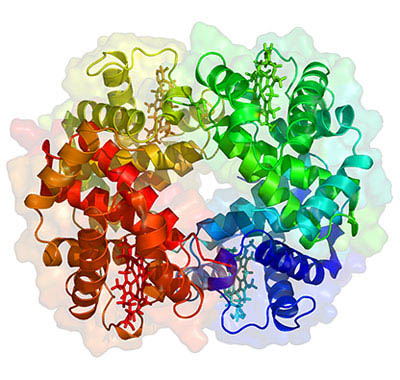 |
INTRODUCTION TO BIOCHEMISTRY Assignments SPRING SEMESTER 2010 |
 |
 |
INTRODUCTION TO BIOCHEMISTRY Assignments SPRING SEMESTER 2010 |
 |
- Come on time and be prepared to contribute
substantively to your group's discussion. This will benefit you and
everyone in your group. It will also make the course more interesting
and enjoyable. To do well in this class (and any other for that matter)
you should spend at least three hours of quality time
outside
of class for each hour in class.
| First week
- Feb 8 to 12 |
Pauling
et al. (1949) - April 7 - 16 |
| Stokes -
Feb 15 to Mar 1 |
Ingram
(1958/59) - April 19 - 26 |
| Zinoffsky
- Mar 3 & 7 |
Dintzis
(1961) - April
28 - May 7 |
| Jigsaw
Groups - Mar 9 to 17 |
Allison
(1954) - May 10 - 14 |
| Concept
Map - March 15 - 19 |
Shemin and Hemin - May 17 |
| Prep
for Midterm Exam - March 19 and 22 |
Hemoglobinopathy Assignment. Due May 14 |
| Midterm
Exam - March 24
and March
26 |
Register
your evaluation of
the
course on line before May 19. |
Wednesday, 10 February - You will be assigned to a group of other CHEM-342 students with whom you will work this semester. Before class, look at Dawn's Eight O'Clock to see what happens when you don't come to class on time. It is one of a series of on-line video vignettes about what you shouldn't do, if you want to have a group that functions well. Many of the actors in the video were students in CHEM-342 at the time. In class you with be working with your new group on a POGIL activity in preparation for reading the Stokes article. Class Canceled due to Snow Storm #2.
Friday, 12 February - There will be an in class activity to prepare you for reading the Stokes (1864) article. Due to the cancelation of the first two classes, this activity will be done as homework, due Monday. Instead, we will do the activities planned originally for February 10.
GROUP ASSIGNMENT after 12 February:
As
a group, do something together--the more fun, the better--take
a hike
in White
Clay Creek State Park,
go skating at the Ice Arena,
build a snow
sculpture,
have dinner
together at a new place, have a bowling
party,
play games, whatever. It has to be an activity everyone agrees to (and
is legal).
Then, write up a one page report from
the group (not individual reports) telling me what you did as a
group and what ground rules
you have agreed upon. Report is due on or preferably before 26
February. If you have reservations about working in groups,
please check out a web-site devoted to issues you probably have.
Monday, 15 February - In class be prepared to apply what you have learned in chemistry classes to figure out what is going on chemically in the demonstration that will be presented. See the Blue and Gold Demo.
Wednesday, 17 February - Initial Discussion of Stokes' Article. Before class, read the background
information on Stokes' (1864) article. Then scan Stokes'
article. To begin with, just focus on the first 10
numbered sections. Try to identify the major themes and write them
down. What has Stokes done? What conclusions does he make? What parts
of the article seem to be the most difficult for you? And then read the
article more carefully and make a list of learning
issues including every word or concept you do not understand.
Using available resources (dictionaries, textbooks, the library,
knowledgeable people) try to learn the meaning of or find answers to
the items on
your list. Note that some of the words or word usages are archaic.
Spend
about three hours of quality time on these activities before
class
and bring your list (and a copy to turn in) to class.
Friday, 19 February - Continued discussion of Stokes' Article. Before this period you should work 2 - 3 hours on your personal learning issues and those assigned in the group. This initiates a cycle of in-class and out-of-class activities in which all members of each group will learn more and more using research articles as a vehicle for that learning. Because this is a group activity and because part of your grade will come from group performance, you need to share in group responsibilities. You need to seek and offer help freely. Twice during the semester you will evaluate your own contributions and those of the other members of your group. Continue during this period to resolve your learning issues and to identify new learning issues that can be looked up and discussed in subsequent class periods.
In class demonstration and use of spectroscopes to see the oxygenation, deoxygenation, and oxidation of hemoglobin. (See PowerPoint presentation of the demonstration)
Monday,
22 February - Assignment
due at the
beginning of class. Grading
will be done according to a set
of rubrics. Bring learning issues associated with Stokes for
discussion after the demonstration
of the reactions Stokes' described
in Section 11 of his paper.
Wednesday, 24 February - POGIL Activity related to Stokes. A list of instructor-generated learning issues will be distributed.
Friday, 26 February - Group ground rules due. Final day for inclass discussion of the Stokes article..
Monday, 1 March - Group Quiz at the Beginning of class. Revised Stokes assignment due at beginning of class for those wishing to improve their grade on the assignment. Grade on the revision will be substituted for the original grade for the assignment, if it is better.
Monday, 8 March - Last day for in-class discussion of the
Zinoffsky article. Wrap-up of the Zinoffsky article.
Beginning Wednesday "Jigsaw"
groups will be formed and each person in your current group will be
working
with students from other groups on a couple of articles. Each group
member
will be responsible for different articles. After about a week, your
original group will reconvene and share what respective members have
learned. See Course
Schedule for
articles and links.
There will be a Jigsaw Group assignment due on Friday, March 19 (see below).
If you have gotten into a pattern that you would like to change (e.g. getting to class on time, doing out-of-class research, participating in group discussion, etc.), this is the week to do that while working with different students and a different tutor.
Because my objective is your learning and I know that learning is facilitated by interactions between individuals and groups, groups studying the same articles will be located next to each other in 205 Brown Lab.
Jigsaw Groups 1 & 8. Bohr et al. (1904) and Peters (1912).Jigsaw Groups 2 & 7. Conant (1923)
Jigsaw Groups 3 & 6. Diggs et al. (1933) and Herrick (1910)
Friday, 26 March - Group
Part of the
2010 Midterm Examination.
Graded Individual Part of the Midterm Examinations will be returned
after the Group Part of the Examination on April 5.
Wednesday, 7 April
- Video on Linus Pauling. Linus
Pauling was one of the intellectual giants in science of the 20th
century. It is worth your knowing a little about him above and beyond
his contributions to our understanding of hemoglobin and sickle cell
anemia.
Read the Pauling
et al. (1949) article and its background
material before class and come to class with a list of learning
issues. In groups, pursue personal and group learning
issues.
Friday, 9 April - A list of at least 10 learning issues is due at the beginning of class, if you wish them to be graded. Your learning issues now should display more sophistication than they did earlier in the semester. You may want to review the characteristics of good learning issues.
Monday, 12 April - Resolve any remaining learning issues. [The Pauling
et
al.
paper does not have an abstract.
Review the characteristics of a good scientific abstract. You can
peruse as many abstracts as you want at PubMed.
You might like to look at, How to
Prepare the Abstract, from
Robert Days' delightful book, "How
to Write and Publish a Scientific Paper" now in its fifth
edition. Each student will write and turn in an abstract, due
Friday, for the Pauling et al. (1949) article]
Wednesday 14 April - Resolve remaining learning issues associated with the Pauling et al. article. Prepare for quiz Friday.
Friday 16 April - Abstracts for the Pauling et al. article due. Group Quiz on the Pauling et al. (1949) paper at the beginning of class.Wednesday, 21 April - Continued discussion of the Ingram articles.
Friday, 23 April - Research your learning issues in some depth and come to class prepared to discuss what you have found. Continue to generate new learning issues as you become aware of things you don't understand or need to look up. Many of the issues that are important for understanding the Ingram article will be helpful in researching your variant hemoglobin for your hemoglobinopathy assignment.
Monday, 26 April - Group Quiz on the Ingram Articles.Monday,
17 May - Shemin and Hemin POGIL